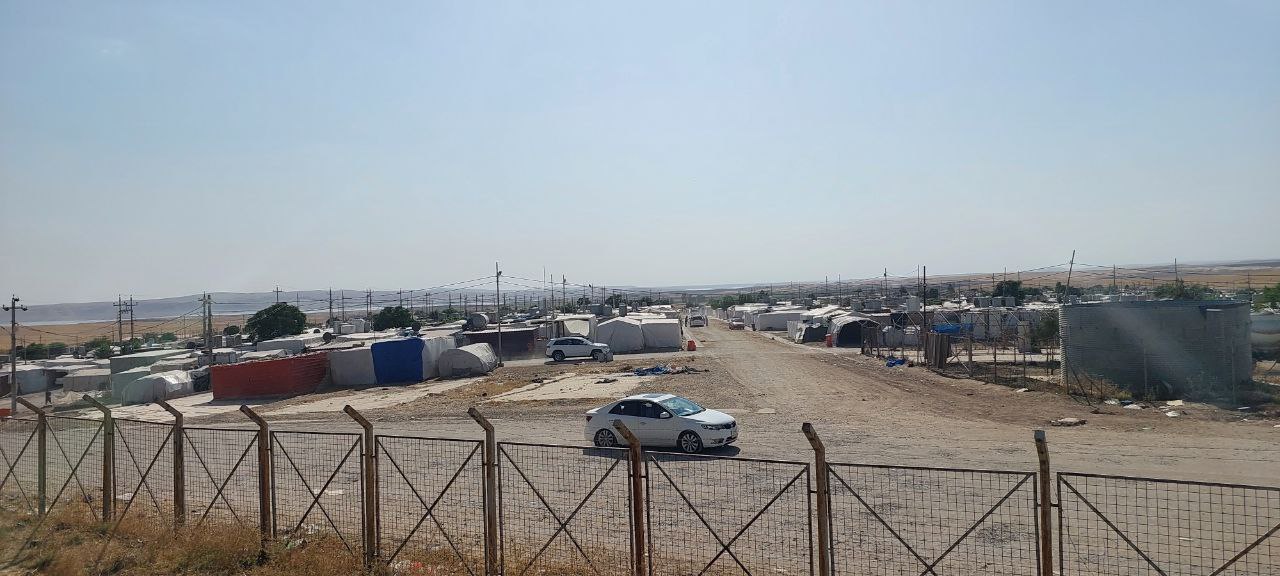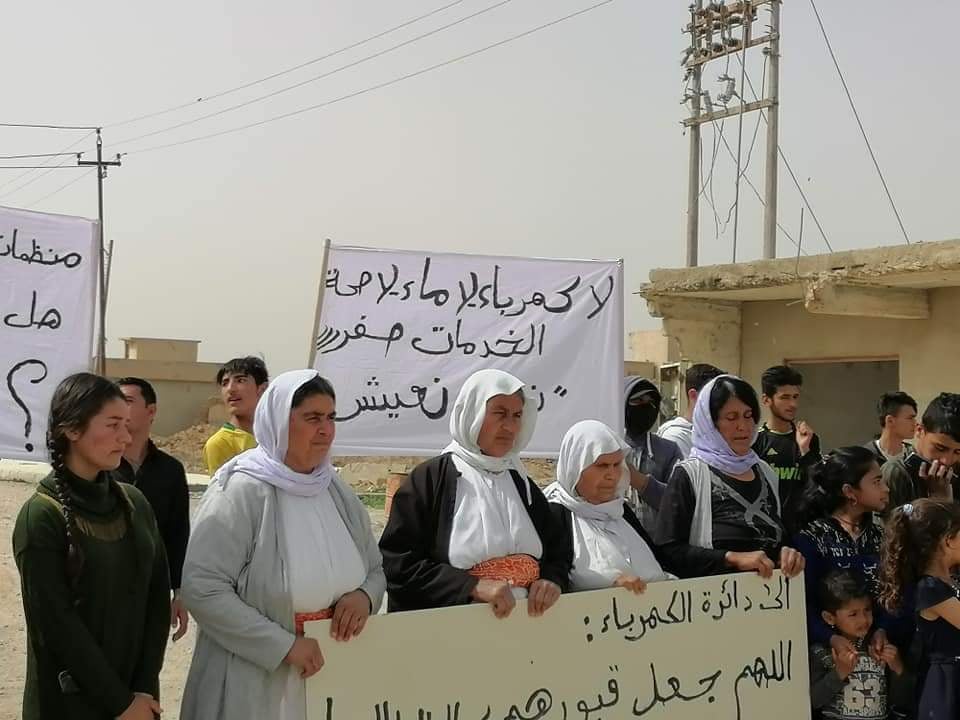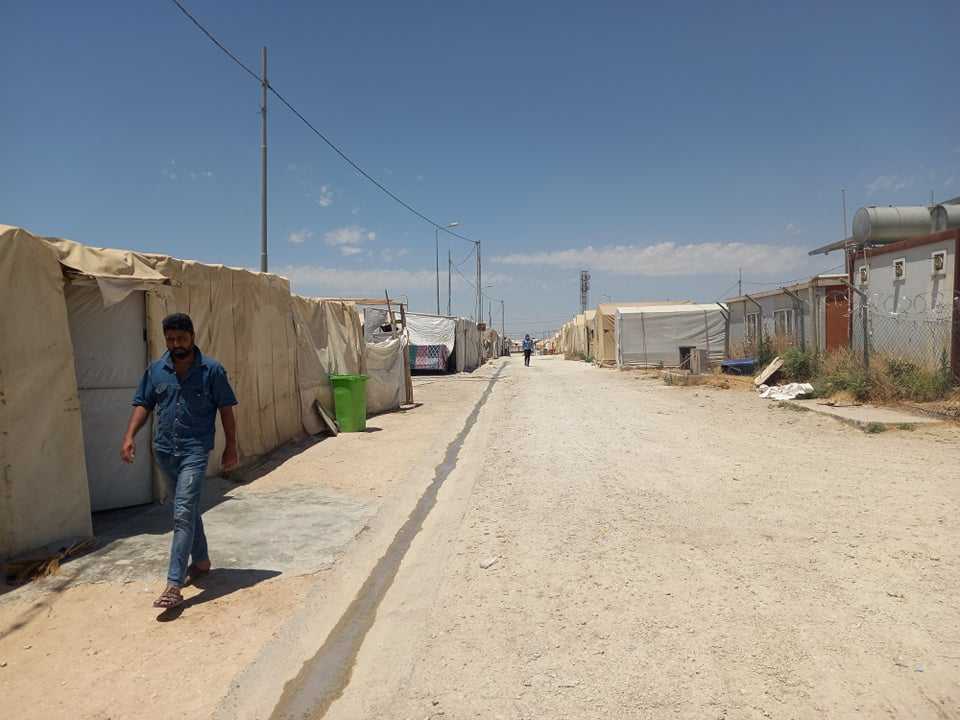Fadil Nader hoped for the best in returning to his homeland and did not want to leave it again due to unemployment and deteriorating services, but in the end he was forced to head back to Internally Displaced Persons IDPs camp.
Nader, a father of three children, decided to return to the camp for the sake of his family, after spending years suffering there under tents.
“The return home was not what we expected. When we were in the camp, they told us that we our suffering would come to end after returning home and rest, but things did not go that way,” Nader, 33, bitterly said.
He explained to KirkukNow that he rented a house in the Sinuni sub-district of Shingal (Sinjar) district, home for the Ezidi (Yazidi) community, after his return, because his house was destroyed due to the war.
“During that period, I moved between three rented houses, the rent for each of which was 150 thousand dinars (USD100).” This amount was a lot for him because his source of income was from working as a daily-paid worker, which was not available every day.
The return home was not what we expected
The story of the Nader family’s return lasted two months. They left Persev camp in Dohuk Northern Province on May 20 and returned to it on August 25.
More than a thousand Shingali families have returned again to life in displacement and camps during the past two years, according to statistics obtained by (KirkukNow) from the Iraqi Ministry of Migration and Displacement. In contrast, dozens of families return every month from the IDP camps of the Iraqi Kurdistan Region to their hometowns.
According to KirkukNow's observations, unemployment, the deterioration of public services such as electricity and water, and the slow reconstruction work in Shingal are among the main reasons behind the reverse displacement of residents.
Iskandar Muhammad Amin, director of the Iraqi Immigration and Displacement Department in Dohuk, told KirkukNow, “The displaced are free to return to camps and no one is forced to return home, but any displaced person who returns to his home will have his file shut with us and be deprived of all types of assistance if he regrets returning home and returns to camps.”
Hundreds of families residing in the camps suffer from a lack of aid, a scarcity of drinking water, and the poor quality of food distributed to them by the Iraqi government.
“Any family that wants to return again, if they are given housing in the camps, it is up to the camp administration and we cannot help them,” Muhammad Amin said.

There are 16 camps for the IDPs in Dohuk Governorate, in which more than 26 thousand families reside, while more than 38 thousand other displaced families live outside the camps.
Nader returned again to Persev camp and was given a tent there. “I was eager to stay in Sinuny, if there were job opportunities, but because of unemployment and my inability to pay the rent in addition to the water and electricity bills, I was evicted from three houses.”
He says that many other families, including his parents, brothers, and friends, were forced to return to the camps. “We returned hoping to find job opportunities, but that did not happen and no organization or party asked about our conditions.”
Every displaced family returning from the camps to Shingal receives a grant of 1.5 million Iraqi Dinars IQD (USD1,000) as part of the Iraqi government’s efforts to close all camps, as all camps located in areas under the authority of the federal government have been closed, and only 26 camps remain in the Iraqi Kurdistan Region IKR run by the Kurdistan Regional Government KRG.
We returned hoping to find job opportunities, but that did not happen
“From time to time, four or five families visit us asking to allocate tents for them after they return back from Shingal to the camp. Fifteen days ago, four families asked for tents, but we did not have space, so they were forced to reside outside the camp,” said Pir Alo Kachal, supervisor of Khanky camp.
He pointed out that about 500 families returned from Shingal to the IKR camps within the past few months.
"Some of whom reside outside the camps or move to other cities in the region, or live in camps if space is available for them."
The director of Khanky camp in the Semel district of Dohuk Governorate says that they inquired about the reasons for the reverse displacement of most of the displaced people, and their answer was, “The lack of job opportunities and the deterioration of services, including health services, or their inability to rehabilitate their houses that were destroyed by the war.”
Shingal fell under the control of the extremist militants of ISIS in August 2014, and within months, thousands of houses, buildings, and service sectors in the district were destroyed as a result of the war.

Pir Dian Jaafar, Director of the Department of Migration, Displacement, and Crisis Response of the KRG, told Kirkuk Now, “We have a special committee for families returning from Shingal to Kurdistan region. It receives these families every Wednesday. If a place is available for these families in the camps, the committee sends a letter to the camp administration asking to receive them, otherwise they are forced to live outside the camp.”
Over 664,000 IDPs live in the IKR, most of them from Nineveh Governorate, specifically from Shingal District, 30% of them are Ezidis.
“We try as much as possible to provide housing for returning families inside the camps, and we do not distinguish them from other displaced people, and we distribute aid to them like others,” according to Jaafar.
The reconstruction process in Shingal, which has had two local administrations for years, is subject to the implementation of the provisions of the Shingal Agreement, which has been confirmed in the ministerial platform of the Iraqi government, and although the agreement was concluded in 2020, its provisions have not been implemented yet.
The director of the region's Department of Immigration and Displacement says that their follow-ups and inquiries have shown that the security conditions, lack of services and lack of job opportunities are among the reasons for the wave of reverse displacement.
The process of closing the camps and returning the displaced to their areas sparked mutual accusations between officials in the Iraqi federal government and the KRG.
Six million Iraqi citizens were displaced from their areas due to the ISIS war and the military operations of the Iraqi forces in the period from 2014 to 2017, and according to statistics from the International Organization for Migration IOM, more than a million citizens are still living in displacement, including the displaced people residing in the camps of the IKR.
Nader is an example of many displaced people who were not happy to live neither in their homes nor in the camps. As he says, the fate of his family fell into unknown hands following several years spent under tents.





